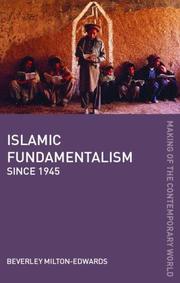| Listing 1 - 10 of 977 | << page >> |
Sort by
|

ISBN: 0415301726 Year: 2005 Publisher: Abingdon, UK : Routledge,
Abstract | Keywords | Export | Availability | Bookmark
 Loading...
Loading...Choose an application
- Reference Manager
- EndNote
- RefWorks (Direct export to RefWorks)
Book
ISBN: 0691163642 9780691163642 Year: 2015 Publisher: Princeton (Calif.): Princeton university press,
Abstract | Keywords | Export | Availability | Bookmark
 Loading...
Loading...Choose an application
- Reference Manager
- EndNote
- RefWorks (Direct export to RefWorks)
The Muslim Brotherhood has achieved a level of influence nearly unimaginable before the Arab Spring. The Brotherhood was the resounding victor in Egypt's 2011-2012 parliamentary elections, and six months later, a leader of the group was elected president. Yet the implications of the Brotherhood's rising power for the future of democratic governance, peace, and stability in the region is open to dispute. Drawing on more than one hundred in-depth interviews as well as Arabic language sources not previously accessed by Western researchers, Carrie Rosefsky Wickham traces the evolution of the Muslim Brotherhood in Egypt from its founding in 1928 to the fall of Mubarak and the watershed elections of 2011-2012. Further, she compares the Brotherhood's trajectory with those of mainstream Islamist groups in Jordan, Kuwait, and Morocco, revealing a wider pattern of change. Wickham highlights the internal divisions of such groups and explores the shifting balance of power among them. She shows that they are not proceeding along a linear path toward greater moderation.Rather, their course has been marked by profound tensions and contradictions, yielding hybrid agendas in which newly embraced themes of freedom and democracy coexist uneasily with illiberal concepts of Shari'a carried over from the past. Highlighting elements of movement continuity and change, and demonstrating that shifts in Islamist worldviews, goals, and strategies are not the result of a single strand of cause and effect, Wickham provides a systematic, fine-grained account of Islamist group evolution in Egypt and the wider Arab world.
Book
ISBN: 185513022X 9781855130227 Year: 1991 Publisher: London: Riyāḍ al-Rayyis lil-Kutub wa-al-Nashr,
Abstract | Keywords | Export | Availability | Bookmark
 Loading...
Loading...Choose an application
- Reference Manager
- EndNote
- RefWorks (Direct export to RefWorks)
Book
ISBN: 9789814951845 9789814951838 9814951846 Year: 2021 Publisher: Singapore : ISEAS Publishing,
Abstract | Keywords | Export | Availability | Bookmark
 Loading...
Loading...Choose an application
- Reference Manager
- EndNote
- RefWorks (Direct export to RefWorks)
The rise of religious extremism in public discourses is a cause for concern for government officials and moderate Muslims. While a substantial body of research on violent extremism is available, the issue of non-violent extremism remains neglected by scholars. Although exposure and subscription to non-violent extremism do not automatically lead to violence, it still needs to be curbed because it can fan hatred that in turn can lead to physical violence and repression of human rights. Non-violent extremism also boosts polarization in the community. Given this potential impact, the government needs to pay more attention to the dissemination of non-violent extremist public discourses, especially on social media. It could work together with influential religious organizations which possess immense religious authority and legitimacy.
Book
ISBN: 9782226193100 2226193103 Year: 2009 Publisher: Paris: Albin Michel,
Abstract | Keywords | Export | Availability | Bookmark
 Loading...
Loading...Choose an application
- Reference Manager
- EndNote
- RefWorks (Direct export to RefWorks)
Book
ISBN: 2715407920 Year: 2021 Publisher: Paris : Presses Universitaires de France,
Abstract | Keywords | Export | Availability | Bookmark
 Loading...
Loading...Choose an application
- Reference Manager
- EndNote
- RefWorks (Direct export to RefWorks)
Book
Year: 2021 Publisher: Leiden : Leiden University Press,
Abstract | Keywords | Export | Availability | Bookmark
 Loading...
Loading...Choose an application
- Reference Manager
- EndNote
- RefWorks (Direct export to RefWorks)
Book
Year: 2014 Publisher: Carlisle Barracks, PA : Strategic Studies Institute and U.S. Army War College Press,
Abstract | Keywords | Export | Availability | Bookmark
 Loading...
Loading...Choose an application
- Reference Manager
- EndNote
- RefWorks (Direct export to RefWorks)
U.S. experts fear violence could once again break out in Bosnia-Herzegovina, and some even want the North Atlantic Treaty Organization (NATO) to mount another military mission there. Yet few of these experts focus on the danger of gradually expanding Islamism. In Bosnia, it appears to have made slow but steady progress, despite resistance from Bosnia's moderate Muslims. Senior Bosniak (Muslim) leaders retain their long-standing Islamist ties, and their calls to impose traditional Islamic law, or sharia, and develop closer ties with the Islamic world only aggravate Bosnian Croat and Serb separatism.

ISBN: 3896781634 9783896781635 Year: 2000 Publisher: Darmstadt Wissenschaftliche Buchgesellschaft
Abstract | Keywords | Export | Availability | Bookmark
 Loading...
Loading...Choose an application
- Reference Manager
- EndNote
- RefWorks (Direct export to RefWorks)
Book
Year: 2014 Publisher: Carlisle Barracks, PA : Strategic Studies Institute and U.S. Army War College Press,
Abstract | Keywords | Export | Availability | Bookmark
 Loading...
Loading...Choose an application
- Reference Manager
- EndNote
- RefWorks (Direct export to RefWorks)
U.S. experts fear violence could once again break out in Bosnia-Herzegovina, and some even want the North Atlantic Treaty Organization (NATO) to mount another military mission there. Yet few of these experts focus on the danger of gradually expanding Islamism. In Bosnia, it appears to have made slow but steady progress, despite resistance from Bosnia's moderate Muslims. Senior Bosniak (Muslim) leaders retain their long-standing Islamist ties, and their calls to impose traditional Islamic law, or sharia, and develop closer ties with the Islamic world only aggravate Bosnian Croat and Serb separatism.
| Listing 1 - 10 of 977 | << page >> |
Sort by
|

 Search
Search Feedback
Feedback About UniCat
About UniCat  Help
Help News
News